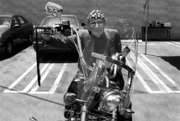Zipper King Robert Eisenberg Dies at Age 105
Robert “Robbie” Eisenberg, sometimes referred to as the “dean” of the zipper business, passed away from a heart attack on Sept. 30. He was 105. Eisenberg was a zipper manufacturer for trimmings supplier Zabin Industries Inc. in Los Angeles, where he worked until he was 102 years old.
Eisenberg helped build Zabin’s zipper business into a multinational supplier of zippers, notions, buttons, threads and snaps. The company has facilities in Los Angeles and Orange County, as well as in Hong Kong and Mexico. Its parent company, American Zabin International, provides trims, graphic-design services and laser bar coding.
Eisenberg made his initial foray into the zipper industry in 1954 with Richford Industries, where he worked with Zabin company founder Bart Zabin in the Robin Zipper division. He worked there until his initial retirement in 1970, when the company was sold and became Robin Zipper Co. In 1975, Bart Zabin bought the company and renamed it Zabin. He sold it in 1979 to current owner Alan Faiola, who hired Eisenberg out of retirement in 1980. Eisenberg remained at Zabin until his final retirement three years ago.
At that point, Eisenberg was recognized as America’s oldest worker. The notoriety led to an article in People magazine, in which he was quoted as saying, “I want to die with my shoes on. Right here [at Zabin].”
Aside from his career in the garment industry, Eisenberg led a colorful life. He was born in Central City, Colo., to Polish garment-makers who had immigrated to the United States in the 19th century. In Colorado, he grew up alongside cowboys. After his two sisters were born, the family moved to New York, where Eisenberg embarked on a medical career. He attended New York University as a pre-med student but never completed his studies, choosing to learn the manufacturing business instead. He was drafted by the U.S. Army during World War I, but he never made it to battle because the conflict ended on the day he got his orders. After World War II, Eisenberg settled in California, where he lived in the Beverly Hills Hotel before buying a home near the resort.
He never revealed any secrets to his longevity but stated that he ate and drank whatever he wanted. Among his favorite periods were the Roaring ’20s and the ’40s, when he was living in New York and could be found attending performances by Benny Goodman and Frank Sinatra.
Faiola said Eisenberg was an inspiration to everyone at Zabin, as well as to the company’s clients.
“He was held in very high regard,” Faiola said. “He never lived in the past and always thought of today and moving forward. That’s one of the reasons he got along well with people two to five times as young as he was. He would talk to them about politics and sports.”
Eisenberg is survived by his daughter, Phyllis Barry of North Hollywood, Calif. He outlived all of his other family members. His first wife, Judith, died in 1929, and his second wife, August, died in 1988. He lost his son during World War II.
A memorial service will be held at noon on Oct. 5 at the Hillside Memorial Park and Mortuary in Los Angeles. —R.M.






















